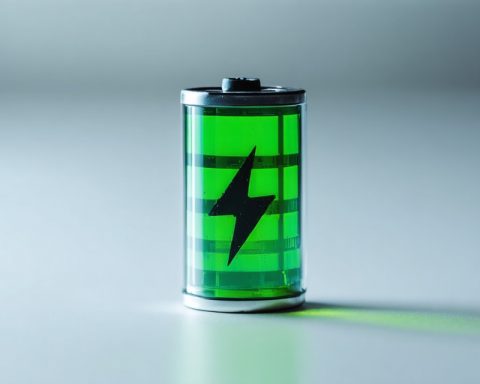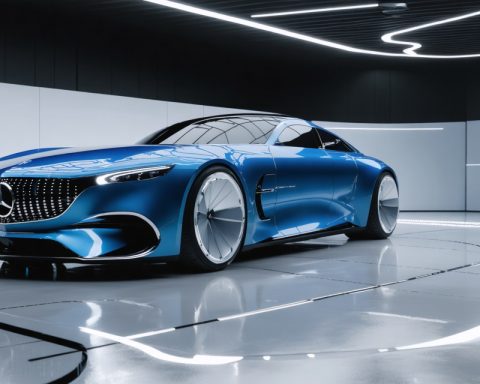- BYD Co. unveils its roadmap to demonstrate all-solid-state batteries by 2027, promising enhanced energy density, quicker charging, and improved safety for electric vehicles (EVs).
- Since 2013, BYD has focused on sulfide electrolytes for solid-state batteries, prioritizing scalability over cost to drive mass adoption.
- BYD plans to integrate these solid-state batteries with lithium iron phosphate batteries to target various EV market segments effectively.
- The development of new facilities and processes is crucial for realizing this technological transformation and supporting production at scale.
- BYD aims to lead the EV industry towards a more electrified and sustainable future, emphasizing innovation and a paradigm shift in battery technology.
Electric skies are set to blaze brighter as BYD Co., a heavyweight in the electric vehicle arena, unveils its ambitious roadmap for all-solid-state batteries, eyeing 2027 for a pivotal demonstration phase. This cutting-edge tech promises to revolutionize electric vehicles (EVs) with greater energy density, quicker charging, and enhanced safety—qualities that spark visions of a cleaner, smarter future.
At the China All-Solid-State Battery Innovation Forum, BYD’s tech maestro hinted at a seismic shift in EV dynamics. Since 2013, the company has been mastering solid-state battery alchemy, selecting sulfide electrolytes for their resilience and viability. The dream of these batteries, Sun noted, hinges not on cost but on scale—volume will eventually drive these innovations to be as cost-effective as their liquid counterparts.
Come 2027, BYD envisions high-end EVs dancing to the rhythm of all-solid-state power, harmonizing with lithium iron phosphate batteries to conquer different vehicle tiers. While this evolution is tantalizing, building the future demands fresh foundations. The company readies to forge new paths, cultivating novel plants and processes essential for this technological renaissance.
In a landscape eager for advancement, BYD accelerates the industry’s arc toward a more electrified tomorrow. As Sun’s words resonate—cost is a journey, not a destination—BYD pledges not just a product, but a paradigm shift. Their strides fuel anticipation of a new era, embedding BYD at the vanguard of EV artistry, where dreams of better batteries sculpt reality.
Solid-State Revolution: Why BYD’s Battery Breakthrough Could Redefine the Future of EVs
BYD’s Next-Gen Batteries: Exploring Practical Applications
As BYD moves toward a future dominated by all-solid-state batteries, it’s essential to delve into the specific ways these innovations can be applied both on the road and beyond. Here, we examine potential real-world use cases, industry forecasts, pros and cons, and offer insights into the upcoming solid-state battery era.
How Solid-State Batteries Are Poised to Transform EVs
How-To Steps & Life Hacks
1. Rapid Charging: Enjoy faster charging times due to the unique properties of solid-state batteries. For EV users, this means significantly reduced downtime at charging stations.
2. Increased Range: Gain more driving range on a single charge due to higher energy density. This is particularly beneficial for long-distance travelers who can now plan fewer stops.
3. Safety Improvements: Benefit from reduced risks of overheating and fire. The solid electrolyte reduces the risk of leakage and short-circuiting.
Real-World Use Cases
– High-End EV Market: BYD’s all-solid-state batteries are expected to first appear in premium electric vehicles. These batteries will provide high performance and efficiency, appealing to luxury car buyers.
– Public Transport: Bus fleets could be upgraded with solid-state technology, enabling longer routes without charging and decreasing operational costs.
– Grid Energy Storage: Test the application of these batteries in storing renewable energy. Solid-state batteries could provide a more stable and efficient solution for energy grid stabilization.
Market Forecasts & Industry Trends
The solid-state battery market is anticipated to grow substantially. According to a report from Allied Market Research, the global market for solid-state batteries could reach $53.6 billion by 2027. As companies like BYD and competitors such as Toyota invest in this technology, expect a significant industry shift toward higher efficiency and sustainability.
Controversies & Limitations
While promising, solid-state technology is not without its challenges:
– Cost: Initially, the cost of producing solid-state batteries may be higher than traditional lithium-ion batteries. However, as BYD suggests, this barrier will lower as production scales.
– Manufacturing Hurdles: Developing solid-state batteries at a commercial scale demands new manufacturing techniques and processes, which can pose significant hurdles.
– Raw Materials: Access to rare materials needed for solid-state batteries could become a concern, impacting production and costs.
Features, Specs & Pricing
Although specific specs for BYD’s upcoming solid-state batteries are still under wraps, features likely include:
– Higher Energy Density: Expected to significantly outperform current batteries.
– Faster Charge Times: Potential to reduce EV recharge times to under 30 minutes.
– Longevity: These batteries promise a longer lifespan than current battery technology.
Pricing will initially target the premium vehicle segment, with costs expected to decrease as production becomes more widespread and efficient.
Security & Sustainability
Solid-state batteries have a smaller environmental footprint compared to traditional lithium-ion batteries, making them a more sustainable choice. Since they bypass the liquid electrolyte used in conventional batteries, they present fewer environmental hazards.
Pros & Cons Overview
Pros:
– Higher energy density leading to increased vehicle range.
– Improved safety and reduced fire hazard.
– Faster charging capabilities.
– Longer lifespan.
Cons:
– Higher initial costs.
– Manufacturing challenges.
– Resource limitations for critical materials.
Actionable Recommendations
– Stay Informed: Monitor developments from BYD and other major players in the EV sector for updates on solid-state battery technology.
– Consider Timing: If you’re planning to purchase an electric vehicle in the next few years, evaluate whether waiting for solid-state models might suit your needs better.
– Evaluate Investment Opportunities: With the market expected to grow, look into potential investments in companies pioneering this technology.
For further information and updates, consider visiting BYD and other leading EV technology firms.
By understanding the potential and addressing the challenges, you can better prepare for a future where solid-state batteries become the benchmark for electric vehicles, offering longer range, improved safety, and greater overall efficiency.







